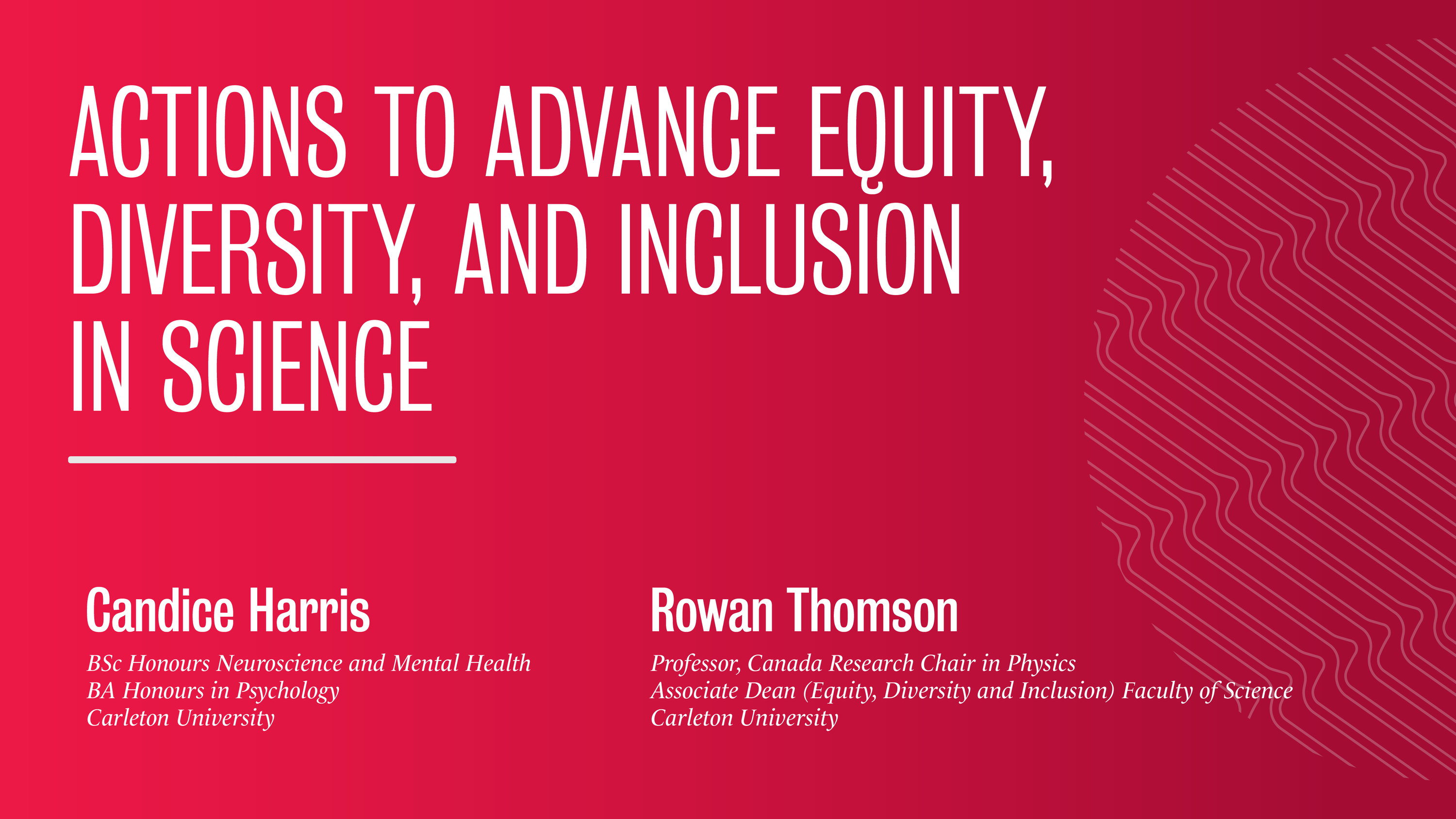
There's
growing
awareness
of
the
lack
of
diversity
in
science
and
the
presence
of
barriers
to
inclusion.
What
factors
lead
to
disparities
in
representation?
Why
should
we
be
motivated
to
effect
change?
What
can
we
do
to
change
things?
Will
our
actions
really
make
a
difference?
This
presentation
will
focus
on
ideas
to
challenge
the
status
quo
–
actions
to
advance
equity,
diversity,
and
inclusion
(EDI).
We
will
discuss
recent
research
to
illustrate
and
raise
awareness
of
the
many
EDI
challenges
in
science,
then
explore
various
practical
ways
to
take
action
to
advance
EDI.
These
practical
actions
stem
from
our
recently
released
"Science
is
For
Everyone"
Teaching
toolkit,
which
provides
an
abundance
of
ideas
to
diversify
science
education
and
further
support
recruitment,
retention,
and
advancement
of
all
students.
We
will
touch
on
the
importance
of
diversifying
content
and
talk
about
how
Indigenous
content
is
being
brought
into
post-secondary
science
courses.
Finally,
we
will
give
an
overview
of
other
exciting
science
EDI
initiatives
across
research
and
academic
life.
Relevant
links
This virtual talk is free, however registration is required.
About
Candice
Harris
Candice Harris holds a BSc Honours Neuroscience and Mental Health from Carleton University, along with a BA Honours in Psychology. Candice co-created the Equity, Diversity, and Inclusion (EDI) Toolkit, and continues to develop new tools and ideas to foster equity within the Sciences at Carleton. Presently, she is also working with Indigenous Initiatives and the Faculty of Science to design several Collaborative Indigenous Learning Bundles (CILB). Previously, Candice has worked with the Department of Neuroscience at Carleton to write, illustrate, and animate an educational aid to help others better understand the neuroscience of addiction. She placed second at the Carleton Psychology Undergraduate Research Event with her research focused on technological treatments for anxiety disorders. In 2022, she received the Carleton University Provost Scholar Award for Undergraduate Science. For her most recent thesis, Candice explored the neurobiology of social interaction as it relates to novel treatment interventions for Substance Use Disorder. Candice is passionate about discovering and communicating the neurobiological reasons for behaviour to help reduce stigma, and enjoys creatively integrating different perspectives from varying academic disciplines to find innovative approaches to current challenges faced by science and academia.
About
Rowan
Thomson
Rowan
Thomson
is
Canada
Research
Chair
and
Professor
of
Physics
at
Carleton
University
where
she
is
also
Associate
Dean
(Equity,
Diversity,
and
Inclusion)
in
the
Faculty
of
Science.
She
holds
a
BSc
Double
Honours
Mathematics
and
Physics
from
Carleton
University.
Her
PhD
research
was
in
theoretical
high-energy
physics
(Superstring
Theory)
at
Perimeter
Institute
and
the
University
of
Waterloo,
and
was
awarded
Waterloo’s
Pearson
Medal.
Post-PhD,
Dr.
Thomson’s
research
has
focused
on
medical
physics.
Distinctions
include
Ontario’s
Polanyi
Prize
in
Physics
(2011),
Ontario
Early
Researcher
Award
(2015),
Fellow
of
the
American
Association
of
Physicists
in
Medicine
(2020),
and
Member
of
the
Royal
Society
of
Canada
College
of
New
Scholars,
Artists,
and
Scientists
(2022).
Prof.
Thomson
has
great
enthusiasm
for
teaching
and
mentoring
next
generations
of
scientists,
and
advancing
equity,
diversity,
and
inclusion.
The
Institute
for
Quantum
Computing
(IQC)
is
committed
to
fostering
a
welcoming
environment
and
community
for
all
people
who
engage
in
our
mission
to
advance
quantum
information.
We
work
to
raise
awareness,
share
resources,
provide
education
and
funding
opportunities
surrounding
diversity
initiatives,
and
promote
an
equitable,
diverse
and
inclusive
culture.